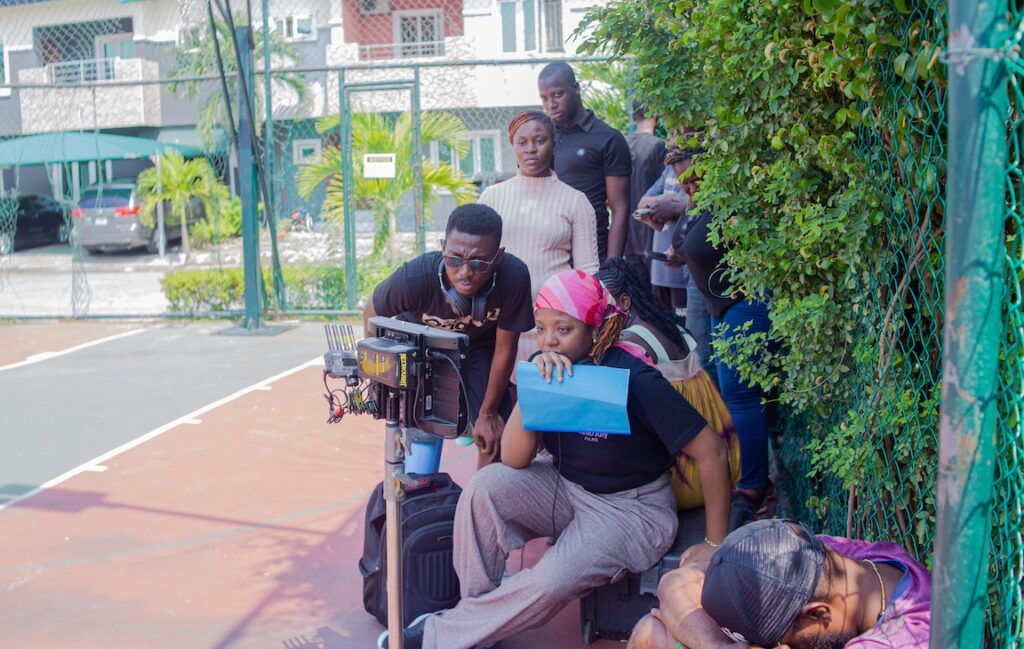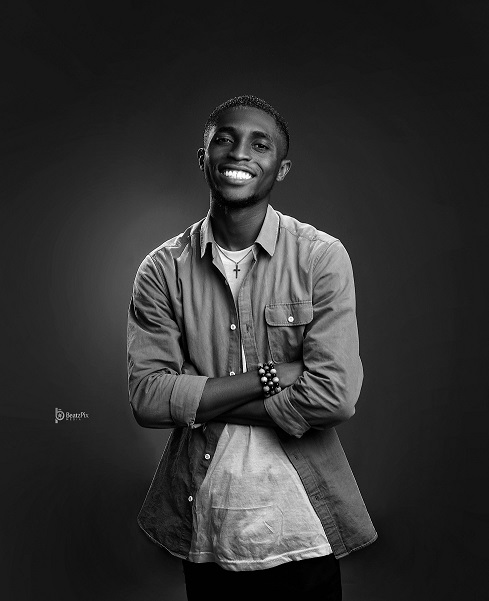Fatima Binta Gimsay was about to graduate university when she reached out to the producer and director Victor Sanchez Aghahowa and offered to intern for free. She’d seen the MultiChoice original shows Tinsel, Hotel Majestic, and Hush, and was transfixed by their stories. She’d grown up watching films that made her want to be part of other worlds, and it gave her a curiosity, a need to try something new. But she was worried that she may not prove her skills, so she did not directly ask Aghaghowa for a job. Fortunately, he gave her the role. She worked on the Africa Magic series Hush, first as a showrunner’s assistant, then as a writer’s assistant. At the same time, she picked jobs elsewhere, as a production assistant for the film Babysitting Ejiro (2016) and as a story researcher for the series Jemeji (2017), where she was also, briefly, a production coordinator.
“Victor was kind enough to take in a clueless girl, and I learned on the job,” Gimsay wrote me via email. “I wasn’t well suited for production work and, honestly, people told me that to my face. They thought I would quit and I don’t understand why they thought it made sense to think that of me.”
She learned to read and write scripts and story breakdowns, spent nights doing research and studying directorial guides, and offered her services to upcoming head writers. In January of 2018, she was accepted into her first writers’ room for the Africa Magic show Eve. Later, she branched out to web series.
In 2020, she wrote and directed her first short film, Why Am I Angry?, about three women from different backgrounds enrolled at an online anger management workshop. It starred Anee Icha, Teniola Aladese, and Genoveva Umeh, and was produced by Nne Nlemadim. It earned her Best Mobile Phone Film at the Toronto International Nollywood Film Festival. Her next film Ijo, out the following year, about a young woman seeking healing and closure through dance, was screened at the British Council, and, in 2022, she directed Omozi, about a mother in debt and desperate to leave the country. In her most recent work, last year’s Fine Girl, a chance encounter with a woman puts a man on the run.
The director, screenwriter, TV producer, and founder of Hello July Films told Open Country Mag about her process making Fine Girl, about support systems and funding challenges, and Nollywood’s storytelling potential.
What inspired you to become a filmmaker, and who are some of your early influences?
It was never my plan to become a filmmaker. I grew up watching amazing films and series that made me want to be a part of different worlds, but I never assumed it could be a career path. For some reason, I felt that path was created especially for a specific type of people. I was radically inspired by Asian films, Mexican telenovelas, South African soaps, and, of course, Nollywood films. Friday episodes of telenovelas were massive moments for me, and seeing things like Jacobs Cross and Girls Cot made me curious about the industry.
Fine Girl is unusual, a departure from traditional Nollywood storytelling. It brings to mind the socially conscious, genre-bending films of Jordan Peele. How did the idea come to you?
Thank you so much for such high praise and comparison. Fine Girl is a film that needed to be made. I had a funding pitch for a feature thriller film, for which I kept getting “aired.” So, instead of waiting around, I told myself that I would make a short film with a similar theme and show people that I am qualified to make a horror and thriller film. The process was from August to November 2024: writing the script, raising funds, shooting, and post-production. The idea is centered on consent, and on mixing an old Nollywood style with modern technology themes.
You’ve worked on shows like Game On, MTV Shuga 5, the 260-episode series Covenant, and, most recently, Slum King. How has that learning curve helped you now that you produce your work?
I made my first round of short films before I worked on these shows, but my biggest learning ground is still television. It made me flexible as a storyteller. In television, you quickly adjust to receiving prompt feedback, working with people different from you, learning that nothing is about you and that it is about the project, that nothing is set in stone. These skills keep you grounded, and you’re able to detach from your ideas and allow things to change for the sole benefit of making a great project. It makes you unselfish as a storyteller.
This magazine published a recommendation of book adaptations, with focus on Nollywood’s storytelling problems. How do you approach this issue as an indie filmmaker, and what challenges do you face doing so?
So I work as both a filmmaker for hire and as an indie filmmaker. The challenge on the indie side of things will always be money. It is expensive to make things. The money used to make a short film in 2025 would have made two or three in 2021. It is tough and somewhat heartbreaking how expensive things have gotten. You cannot compromise on a good story and you also cannot compromise on quality production standards.
When it comes to Nollywood’s storytelling problem, I will not give a generic response. It has to be specific feedback on a specific thing. The industry is hard enough and people are doing their best to make things work; I don’t want to point out what’s not working without giving solutions. Working in television, we told amazing stories and wished for fatter budgets.

Are there support systems from established filmmakers that you are part of, and are they helpful?
This is subjective. Some people have communities and some people float. Some people have healthy mentorships and some wish they never met their mentors or heroes. I encourage creating meaningful friendships with your peers and meeting people in different branches of the industry. Don’t be trapped in one bubble, because it can quickly become a crabs-in-a-bucket situation. Television writers have their bubbles, filmmakers have theirs. I highly recommend mixing and matching, leaving your comfort zone. The healthiest support systems come from unexpected places.
Working behind the camera has been historically challenging for women, and there are stories of how women were not trusted to reliably do their work, in directing, producing, videography. Rita Dominic has said that that lack of trust is why her production company with Mildred Okwo, the Audrey Silva Company, focuses on creating opportunities for women. How have you navigated this in your own work?
The obvious challenge will be getting dismissed, intentionally or unintentionally. Honestly, I don’t care to prove myself to anyone, so I will not explain why you should hear me out. I thankfully don’t deal with this often, but what I encourage is that women take up roles in different departments. I don’t believe the only things we can do should be directing, producing, and writing. I think we should look into cinematography, production design, assistant directing. More people are hosting classes in different departments and I encourage women to try them out.
Too often, one comes across a production that lacks story depth. There’s an obvious solution — investing in professional writers. But it seems that only a few producers are willing to do this, perhaps due to financial implications. For many writers, chances are rare because of nepotism. How can producers and directors give opportunities to new and emerging talent who could add complexity to their scripts?
Thankfully, I am a product of someone giving me a chance without having a clue who I was, and here I am today. [So] I have to disagree with your take because, again, these things are not general facts and experiences are subjective. In getting into the industry, I had to tell people that I was available and “shoot my shot.” It works with some people and it does not work with some. People prefer to work with those they are comfortable with. This is a general human thing and not limited to Nollywood. Human beings thrive on familiarity and social groups. My production company does writing workshops where we connect fresh faces to other writers. It starts somewhere and relationships build and people get comfortable with each other. I know there’s a need to feel like everyone gate-keeps and everyone has a clique, but at the same time people in various departments are also seeking out their tribes, groups, or whatever they want to label it. People do invest in professional writers and it turns out great. You can work with your friend and it crashes on arrival.
The struggle for well-told stories is a problem I admit exists, but it is not because of producers not hiring professional writers. The cause will differ from project to project. Most projects are rushed and writers are expected to churn out a feature-length script in seven days with horrible pay. The process turns to a factory setting job and we forget that the foundation is creativity. Some projects take the script as a suggestion. Some projects use just the first draft to shoot. Every problem has its unique cause. Don’t get me wrong: Nollywood is far from perfect, but we are hard on ourselves in a counterproductive way.
You have said that you are “claustrophobic. . . literally and figuratively.” How does that influence your creative process?
I think the claustrophobia addressed [t]here is my dislike for being boxed. In my creative process, I don’t want to be micromanaged or put in one box. I am okay with failing through things, so let me be. I’ve had people older than me tell me: “You will learn,” “Oh, the work is hard,” “I wasn’t credited for my dues, so you will learn, too,” and I still wonder who they were talking to because it was not the same me. Is anything worth it easy? No. But is that helpful? No. People are scared and they project on us, and I am not here for that. Because you are worried about failing, it doesn’t mean you should put that on me as well. This is not a group project. We should be okay addressing our fears while still being able to show up and do it. It is suffocating when people put you on a pedestal or project and assume on your behalf. Just let me do great stuff and make money doing it, thank you. ♦
If you enjoyed what you just read, consider making a PayPal donation to enable us to publish more like it.
No One Covers Nollywood Like Open Country Mag
— The Best Films, TV, and Performances of the Year: 2023, 2024
— Rita Dominic‘s Visions of Character
— The Epic, Transformative Comeback of Chidi Mokeme
— How Dakore Egbuson and Tony Okungbowa Traverse Trauma in YE!
— With the S16 Film Festival, an Arthouse Collective Locks Its Focus
— How Tolu Obanro, Nollywood’s Top Composer, Crafts the Sounds of Its Biggest Hits
— A Small Indie Producer Bets on Social Justice Cinema
— A Tribe Called Judah, Reviewed: A Box Office-Breaking Heist of Authenticity & Heart
— How Mami Wata Swam to Sundance
— Writing Omo Ghetto: The Saga, Nollywood’s Highest Grossing Film of All-Time
— How Yahoo+ Captured a Desperate Side of Internet Fraud
— Awaiting Trial: Families of SARS Victims Speak in Devastating Documentary
— Country Love Depicts Tenderness in LGBTQ Lives





